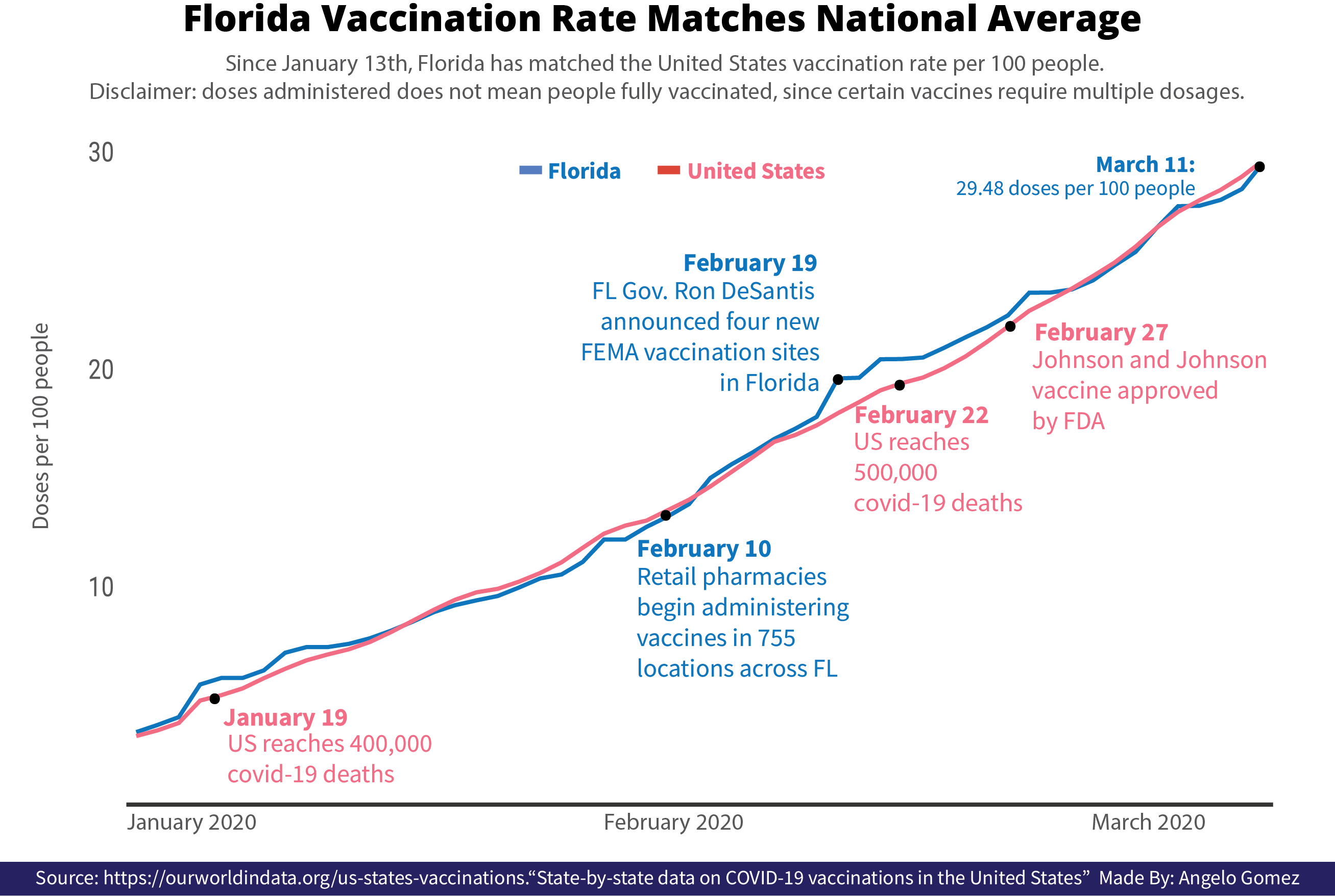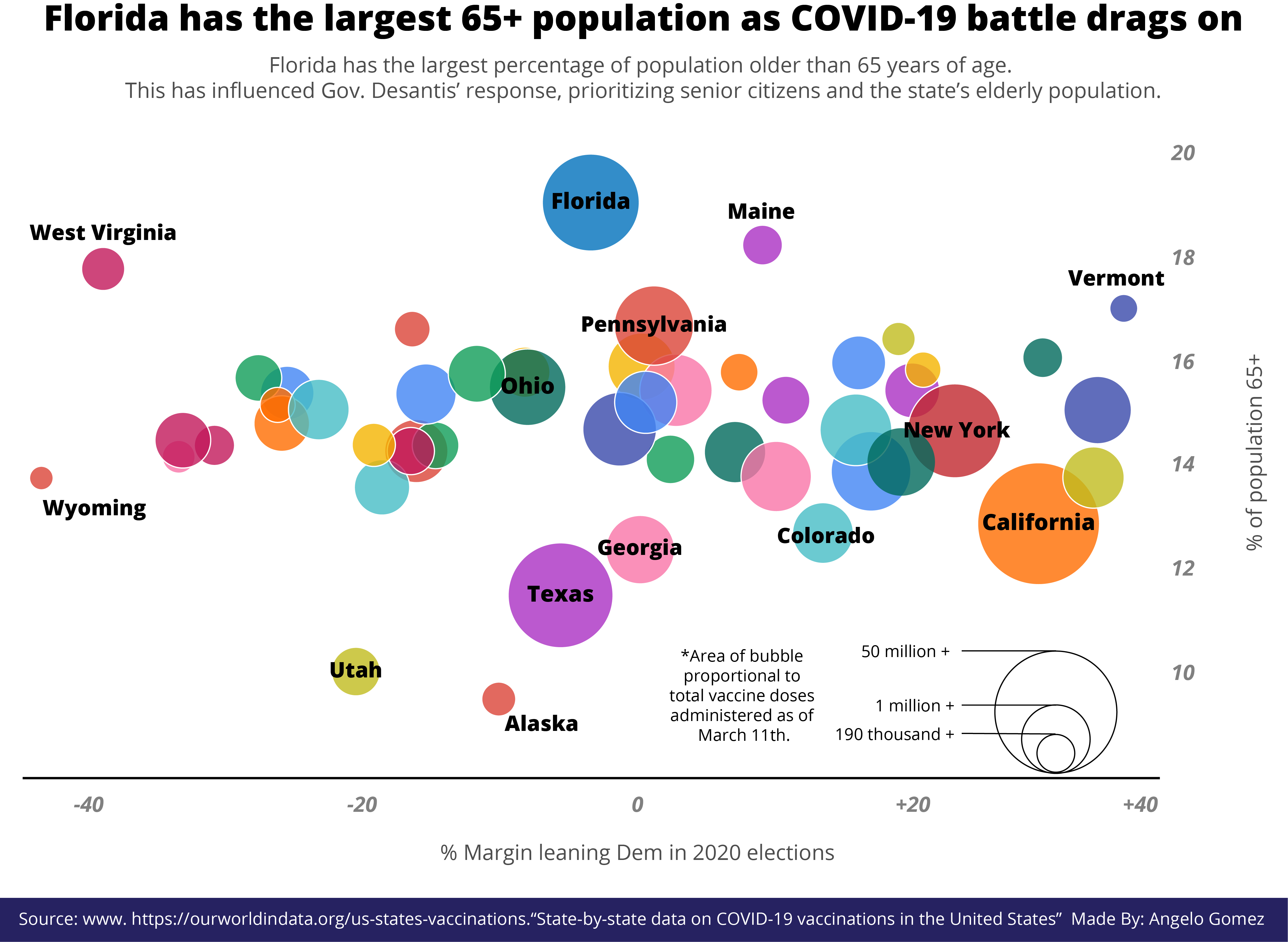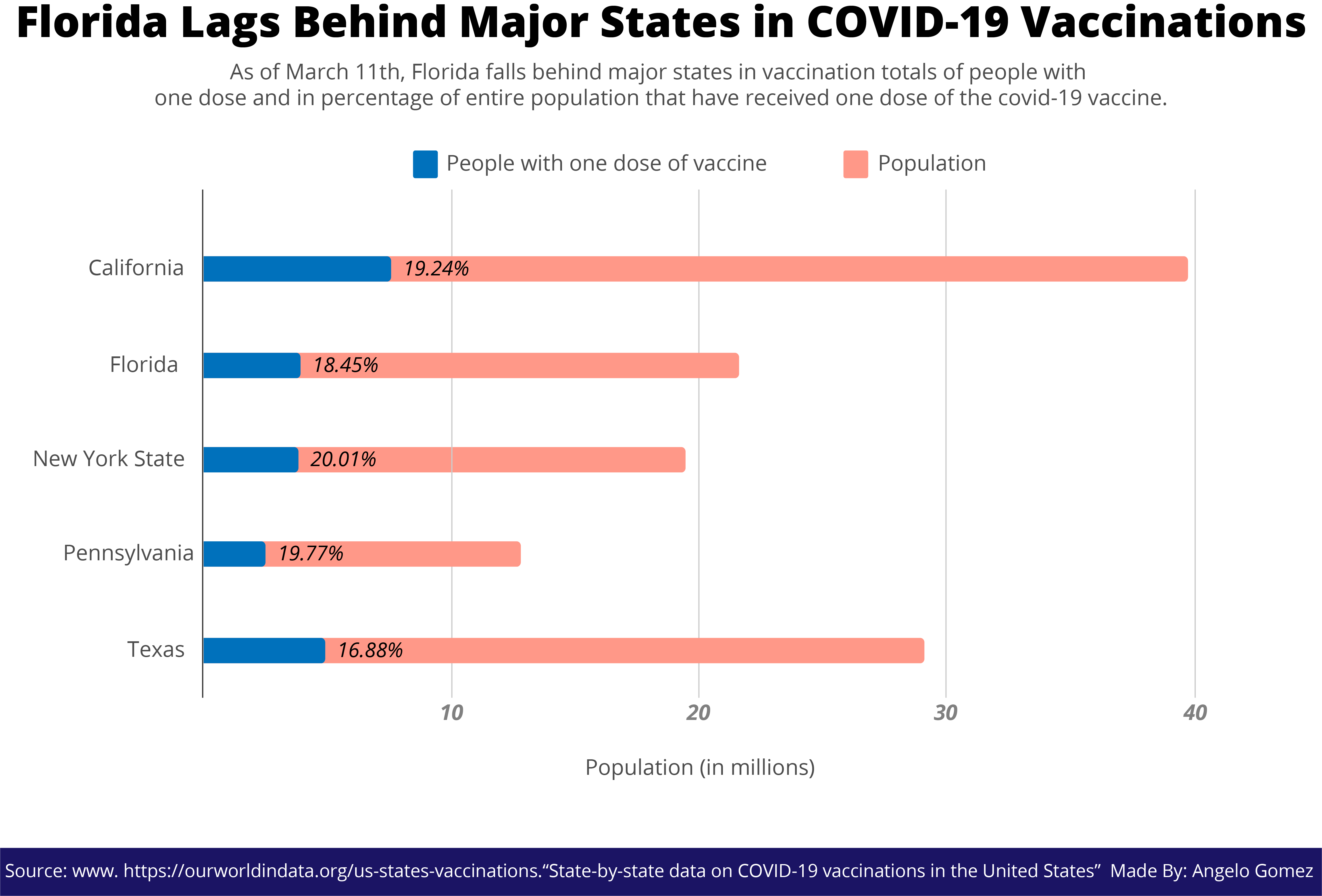After a long and exhausting year of battling the coronavirus pandemic, Florida is still being hard hit. The man in charge of the state’s vaccination response, Gov. Ron DeSantis, has been navigating the issue in the midst of political turbulence and tension.
In the past year, there have been over 1.9 million COVID-19 cases and 32,000 deaths in the state of Florida.
Many in the state and nationwide have blamed the governor for these deaths, calling him Ron “DeathSantis” in response to his “laissez-faire” approach to the pandemic.
Additionally, the arrest of former Florida health department employee Rebekah Jones became a nationwide scandal after she claimed that she was fired after refusing to manipulate data on the state’s COVID-19 public dashboard.
Governor DeSantis responded in a press conference that the allegations were “unfounded” and that “she was fired because she wasn’t doing a good job.”
Furthermore, the governor’s outspoken position against state-wide lockdowns and his unabashed support for Donald Trump have made him a favorite of the former President’s base and a pariah among many others.
While facing criticism for his handling of pandemic protocols and guidelines, he said, “I faced continued pressure from radical Democrats and the liberal media, but I refused to back down. It’s clear: Florida got it right.”
As Florida has begun administering vaccinates inside the state in response to the coronavirus crisis, the governor’s response is once again under intense scrutiny.

As the chart above shows, Florida’s vaccination rate was steadily increasing parallel to the national average. As the FDA approved the Pfizer and Moderna vaccines and these were made readily available nationwide, Florida began administering them to the elderly population first.
On December 23, the Florida Department of Health website declared that priority would be given to health care personnel with direct patient contact, long-term care facility residents and staff, persons 65 years of age and older, and persons deemed extremely vulnerable to COVID-19 by hospital providers.
Likewise, a public health advisory posted on January 21 prioritized Florida residents to be administered the vaccine. DeSantis supported this measure as an effort to discourage “vaccine tourism” from travelers outside the state.
On January 22, Governor DeSantis appeared on Fox News, claiming that Florida was one of the first states to prioritize administering vaccines to the state’s elderly population. He said 65% of the vaccines administered at the time were given to people aged 65 or older.
In the same interview, DeSantis said he faced resistance and backlash to his “unpopular” decision to favor vaccinating the elderly population rather than younger front-line workers.
Since Florida has the largest elderly percentage in the United States, it is clear why the governor prioritized the group considered to be the most vulnerable to the virus, according to the CDC.

However, the governor’s plan did not escape criticism. It is no secret that the elderly population in Florida leans heavily conservative, and the governor was criticized for vaccinating his political base first over front-line workers.
Nikki Fried, the state’s Democratic commissioner of agriculture, publicly criticized DeSantis for allegedly playing political favoritism in the distribution of vaccinations.
In a letter published by Yahoo Finance, she claimed that pop-up vaccination sites were placed in wealthy and affluent ZIP codes, which typically voted in favor of Republicans such as DeSantis and President Trump.
Despite the criticism, Florida has among the highest numbers of vaccination doses distributed and people fully vaccinated in the country, according to the website Our World in Data.
By March 25, DeSantis said in a video that the state had vaccinated “over 70% of the roughly 4.4 million seniors living in the state.”
However, the state’s vaccination rollout has had its fair share of issues and complexities. In reality, the numbers fail to depict the reality of what is truly happening inside the state.
Despite the state’s commitment to vaccinating the elderly population, Florida’s lack of a comprehensive vaccination plan has left a lot of citizens inside the state questioning when it’s their turn for the vaccine and how to get one.
The state’s restrictions on eligibility were left unclear to most Florida residents, especially those who were still vulnerable to the virus, but not yet available to receive it. While state and county guidelines often contradicted one another, the public was left with mixed signals.
As retail pharmacies such as CVS, Walmart and Publix began to offer vaccinations, each site offered its own unique procedures and requirements. Federally-run FEMA vaccination sites have their own sets of guidelines separate from county sites or from local hospitals administering vaccines.
When restrictions began to loosen nationwide, the demand for vaccines were overbearing.
According to a recent analysis, Florida’s vaccination rollout “backfired” as they attempted to widen vaccination coverage and eligibility. The lack of clear information created chaos within the state as there was a lack of information. In some cases, elderly citizens were forced to wait in long lines for extended periods of time to receive a vaccination.

Percentage-wise, Florida is still lagging behind other states in vaccination rates. In rates such as doses administered per 100 people, the state is behind California, New York, and Pennsylvania.
Starting April 5, all Florida residents aged 16 or older became eligible for the vaccine.
Data sources:
All data came from Our World in Data (https://ourworldindata.org/us-states-vaccinations) Any duplicate entries (state totals and dates) were removed. Data was limited to vaccination totals (current or past) in the United States.
All data came from World Atlas
Data came from Cook Political Report
All data collected from U.S. Census Bureau

































